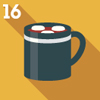The countdown is on
In Conditions
Follow this topic
Bookmark
Record learning outcomes
Prepare customers for the festive season with this advent calendar of winter ailments full of top tips for happy, healthy holidays.
It’s Christmas! This is a phrase that pops up a lot during the festive period, particularly if Noddy Holder is around, and it is usually a way to justify another glass of wine or mince pie. But it can also lead to a classic case of Christmas weight gain. And it’s not just overindulgence that can be detrimental to people’s health during this time of year. All kinds of ailments can make the holidays miserable, but pharmacy teams can be there to help with this advent calendar of winter ailments to ensure customers enjoy the festive period without letting their health suffer.

 Weighing it up
Weighing it up
The British Dietary Association estimates that some people consume around 6,000 calories on Christmas Day alone – three times the recommended daily amount.
A 2018 study by Loughborough University and the University of Birmingham has suggested regular weighing at home as a method to help prevent people gaining weight, as they found that those participants who weighed themselves and recorded the data at least twice per week, but ideally every day, and were given extra information and tips for weight management weighed less than the control group at the end of the study.
“Weight gained during holiday periods often is not subsequently lost and, although these gains are small, over 10 years they would lead to a significant increase in body weight,” says Amanda Daley, professor at Loughborough University’s School of Sport, Exercise and Health Sciences. “Our research has shown that a brief intervention over the Christmas period can help to prevent these small weight gains that accumulate and drive the obesity epidemic.”
 Achoo achoo achoo!
Achoo achoo achoo!
Colds are caused by a viral infection and can easily spread in big groups of people. But don’t get too mad at your relatives, they are called common colds for a reason. Symptoms may include a runny or stuffy nose, sneezing, cough, tiredness, sore throat and headache. Pharmacy teams should remind everyone to remain vigilant with washing their hands, especially before eating and after using the toilet to prevent spreading the infection to others or contracting it themselves. Getting enough rest, keeping warm and drinking plenty of water can also help. For sore throats, the NHS recommends adults gargle with warm salty water. Colds usually last for only a week or two and can be treated without seeing a GP or taking antibiotics. See TM’s Insomnia & stress feature for more.
Some people may consume around 6,000 calories on Christmas Day alone
 Holding on
Holding on
Long Christmas car journeys to visit family and friends are just one of the causes of stress for people who experience bladder weakness. “Winter can have a real impact on those experiencing incontinence, not only because of increased strain on the bladder from coughs and sneezes, but colder weather also weakens the pelvic floor muscles, meaning they are less likely to stop urine leaking from the bladder,” says Stephanie Hickford, brand manager at TENA.
Pharmacy teams should have a good grasp of what products they can offer customers to suit their different needs. “With this in mind, they should stock a suitable range of products that can support a range of shoppers from a reluctant first-time buyer to someone who’s symptoms have worsened in the winter months,” she adds.
Stephanie’s top tips for customers include:
- Avoiding caffeinated or alcoholic drinks
- Avoiding sitting on cold surfaces
- Wrapping up warm to keep the pelvic floor muscles working effectively
- Finding the right protection, such as speciality pads or pants
- Fully emptying the bladder before long journeys.
 Keeping up
Keeping up
In the UK, more than 10 million people have arthritis or similar joint conditions, according to the NHS. Joint pain can effect even the simplest of tasks such as bending down and getting up and down from sitting. So some helpful ideas for preventing pain over the holidays and tips to pass on to customers can include using a perching stool to provide rest for the joints when cooking and taking a foldable walking stick out on long walks. Joint pain may make suffers want to move as little as possible, however, the right exercise can actually be very beneficial and prevent problems worsening over time.
Pharmacy teams should also encourage customers with joint pain to plan ahead for the holidays ensuring they have over-the-counter products to relieve pain, such as oral and topical analgesics and heat and cold therapies.

digestive discomfort.
 Stop the itch
Stop the itch
Itchy skin due to eczema can be severe enough to interfere with sleep, causing tiredness and irritability. Heat, dust, woollen clothing, pets and irritants such as soaps and detergents can trigger symptoms.
The British Skin Foundation suggests the best way to prevent itching is to stay on top of moisturising and apply emollients with clean hands. Avoid triggers, as mentioned, and wear comfortable, cool clothes to keep the skin from overheating.
 You are not alone
You are not alone
The festive season can be lonely for many people. “For customers who are feeling stressed, low or lonely, it [may] help them to talk with a pharmacist or colleague who really listens and shows understanding for how the customer is feeling. Being able to share what you’re going through is important. The customer may not need anything else,” says a Mental Health Foundation (MHF) spokesperson.
Pharmacy staff can also find out about community groups and activities in their local area, such as classes at the local leisure centre or groups who regularly go walking, knit or sing together, which can offer a social environment for customers who are lonely, the charity adds.
 Quiet please
Quiet please
Stress, hangovers, colds and general dehydration can be culpable for headaches over this busy period. Customers should be reminded to drink plenty of water, with six to eight glasses a day recommended. Resting, especially if the person has a cold or flu, relaxing, exercising when possible and taking paracetamol or ibuprofen when necessary, can also help. Customers should be advised not to skip meals, drink too much alcohol, sleep more than usual or strain their eyes as this can all increase the likelihood of a headache, or make one worse.
 Cheers!
Cheers!
In a 2018 UK Innovation survey of 2,059 respondents, 30 per cent of people claimed to drink alcohol before lunch on Christmas day. Pharmacy teams can remind customers that 14 units per week is the recommended limit, and encourage people to reduce their alcohol intake or partake in Dry January after the New Year celebrations to take a break from the booze.
Pharmacy teams should be aware of people who have given up drinking and smoking, which are often associated with Christmas festivities, as these customers may need extra support during this tempting time.
 Warning signs
Warning signs
Not just a summer ailment! Dust, friends’ pets and even Christmas trees can trigger allergy symptoms in the winter months. Pharmacy teams can recommend nasal sprays, eye drops and oral antihistamines to help tackle symptoms. Customers who have any food allergies should also be vigilant and ensure dinner party hosts are aware to prevent an allergic reaction. Anyone with a severe allergy who has been prescribed an epinephrine auto-injector should be reminded to always carry two with them.
 Go with the flow
Go with the flow
A change in diet over the festive period can cause digestive issues such as constipation. Common causes can include a lack of dietary fibre, irregular meal times, reduced liquid intake, limited physical activity and changes in daily routine, according to the NHS. The digestive disease charity Guts UK has these top tips to pass on to customers to help them prevent constipation: exercise, try to maintain regular meals and eat a high fibre diet that includes fruit; vegetables; nuts; wholemeal bread, pasta and cereals; and brown rice.

 The no-fun season
The no-fun season
‘Tis the flu season and although the Christmas festivities share space with this nasty ailment, pharmacy teams can prepare customers in advance. Flu usually comes on more quickly than a cold and has more severe symptoms that may include headache, aching muscles and high temperature. Flu can also make people feel exhausted and need to rest. Pharmacy teams can encourage customers to be proactive and get their flu vaccinations to prevent getting ill. For certain people, flu can be more severe. People aged over 65, pregnant women, people with underlying health conditions and people with weakened immune systems are high risk. But anyone can be encouraged to get vaccinated. Customers should also be advised to maintain good hygiene and wash their hands regularly. Symptoms of flu usually last for a week and during this time pharmacy teams can advise customers to rest, stay hydrated and eat plenty of fruit and vegetables.
 Don’t blame the mistletoe!
Don’t blame the mistletoe!
It is important to remind customers to look after their sexual health at all times of year, but particularly during the festive season when alcohol may be involved. This includes advising the importance of using condoms to prevent sexually transmitted diseases and it is also a good idea to provide information about emergency contraception. Shasha Eva Peng, pharmacy technician from Kellaway Pharmacy in Bristol, says customers should be made aware that private consultation rooms and emergency contraception are available in most pharmacies. “There should be obvious signage to show that you’ve got a private consultation room – it is really important to ensure that the patient’s confidentiality is protected,” she explains. Shasha says teams should also ensure they speak to customers professionally so that they do not feel judged.
 Take time out
Take time out
The accumulation of life’s stresses and lifestyle factors over this period can cause people to become overly tired, run down and susceptible to other ailments like cold and flu.
It is important to remind customers to take the time to rest and recuperate during this busy time by getting outdoors, doing gentle exercise, learning to relax and having some time off drinking and socialising. Alcohol and even midday naps after too much turkey can also affect quality of sleep, which can contribute to making customers feel tired. If not dealt with effectively, tiredness can have an effect on physical and mental health, as well as work and relationships so it’s important to get on top of it swiftly.
It is thought approximately one in three people suffer with seasonal affective disorder
 Sore soles
Sore soles
People may be on their feet much more at this time of year, with dancing the night away at Christmas parties, often in high heels; pounding the pavements Christmas shopping; and that annual Boxing Day walk with the family. Help customers ease their soles by suggesting they rest when possible and use an ice pack for 20 minutes every two to three hours when pain does strike – taking paracetamol may also help if the pain is particularly bad. They should also be advised to wear well-fitting, comfortable shoes and consider using insoles for extra comfort.
 Stretching it out
Stretching it out
Exercise generally has a very positive effect on all aspects of health. From getting in 10,000 steps a day to a brisk morning jog, pharmacy teams can encourage customers to keep their physical activity up, even if they do want to hibernate indoors over the winter. Weekly activities should add up to at least 150 minutes of moderate-intensity activity, or 75 minutes of vigorous intensity, according to national recommendations. The physical and mental benefits of exercise are significant and even doing a little bit can fend off those extra Christmas pounds.
 Counting sheep
Counting sheep
Insomnia is defined as when a person regularly has trouble sleeping. Most adults need approximately eight hours sleep a night, according to the Royal College of Psychiatrists. Common causes of insomnia include stress, anxiety and depression, noise, alcohol, caffeine or nicotine, recreational drugs and shift work. Every Mind Matters, a new mental health campaign from Public Health England (PHE), suggests that people with insomnia try to keep regular sleep hours, create a restful environment, exercise frequently and avoid stimulants such as caffeine. It also suggests confronting sleeplessness and writing down worries to help put the mind to rest.

over Christmas.
 First thing’s first
First thing’s first
Making customers aware of basic first aid can be beneficial, as this time of year is the busiest for the emergency services. For example, the London Ambulance Service’s frontline crews treated almost 101,000 patients in December 2018 – approximately 7,000 more than the monthly average for that year.
Pharmacy teams can recommend OTC products and tips for first aid and let customers know they have the capability to deal with minor injuries such as cuts and grazes, burns and scolds, bites and stings and some allergic reactions.
 Bad turkey
Bad turkey
Not everyone is a super chef and living on Christmas leftovers that haven’t been reheated properly can lead to a nasty bout of food poisoning, so it’s important to remind customers to be vigilant. If they do succumb to festive food poisoning, make customers aware that it is often not serious and should pass within a week or so.
Symptoms include nausea, diarrhoea, vomiting, stomach cramps and high temperatures of over 38°C. Customers should try to sip water as much as possible and eat small, bland meals such as toast, bananas and crackers. Pharmacy teams can also recommend oral rehydration solutions, if necessary.
 Keeping calm
Keeping calm
A family game of Monopoly is not the only cause of stress during the festive period. Cooking, entertaining and money can all contribute to rising stress levels.
The MHF says customers should be encouraged to take time to unwind during the busy period. “Getting enough sleep, staying physically active, eating healthily, drinking alcohol sensibly and doing something they are good at”, can really help customers relax, adds a MHF spokesperson.

from home is important.
 And breathe
And breathe
Asthma deaths are on the rise, with over 1,400 people dying from an asthma attack in 2018 – an eight per cent increase from 2017. The cold weather, let alone colds and flu, can make symptoms of asthma worse.
So for this holiday season it is important that pharmacy teams encourage customers to be prepared. Asthma UK recommends that customers book in an asthma review and check that their personalised asthma plan is up to date, monitor their inhaler technique and make sure their inhalers are still in date. Examples personalised asthma plans can be found online. Customers should take a note of holiday opening times and keep a record of out-of-hours numbers, which pharmacies can helpfully stick up for customers to see before the festive break. Avoiding triggers will also really help. Triggers can include dust, other people’s pets and pollution; even Christmas trees can trigger symptoms.
 Preparation is key
Preparation is key
Any holiday means people’s usual day-to-day schedule can be disrupted. For individuals who need to take regular medication this can have serious consequences. Pharmacy teams can offer customers tips to remember to take their medication, including setting alarms and preparing dosette boxes well in advance, which can be especially helpful if people are staying away from home. Pharmacy teams should also remind customers to order any prescription medication they might need to last over the Christmas period.
 Passing through
Passing through
The norovirus, also known as the winter vomiting bug, is a stomach bug that causes vomiting and diarrhoea. It usually lasts around two days and can be very unpleasant. Public Health England says there is no specific cure for such stomach bugs, but there are a few things people can do to stay healthy whilst it passes through their system. This includes staying hydrated, taking paracetamol and preventing spreading the bug by practising good hygiene like washing the hands and staying at home during the infection and for two days after symptoms clear. Norovirus spreads very easily and washing hands frequently with soap and water is the best way to stop it spreading.
30 per cent of people claimed to drink alcohol before lunch on Christmas day
 Seasonal SADness
Seasonal SADness
Approximately one in three people suffer from seasonal affective disorder (SAD). This is sometimes known as winter depression because it is prevalent in the dark winter months. Symptoms can include low mood and energy, loss of pleasure, irritability, feelings of despair and guilt, feeling lethargic, sleeping for longer and weight gain. Mental health charity Mind says self care tips such as encouraging customers to talk to someone, keeping a diary, learning to relax and exercising can help people manage symptoms. Getting outside and exposure to sunlight can also be suggested.
 Unpleasant resurgences
Unpleasant resurgences
With indigestion it’s best to recognise the cause and many of the most common causes are particularly prevalent at this time of year: excess alcohol, heavy smoking, overeating, weight gain, rushed meals, eating too much fatty or spicy foods and taking certain medications. Lifestyle changes can help, such as avoiding the foods mentioned, exercising and quitting smoking. Many people also control their symptoms by taking OTC antacid tablets or liquids as appropriate.
